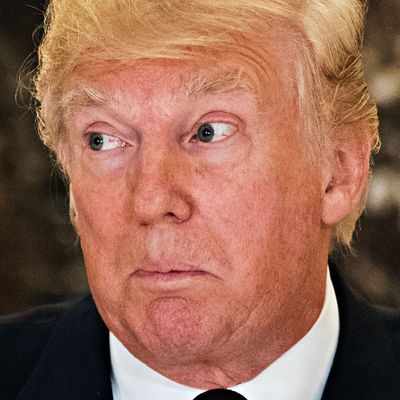
Without question, one of the most important political stories of the last several years has been the near-total capitulation of the Republican Party to a takeover by Donald Trump. From tippy-top elites to the grassroots, the GOP is very much Trump’s party now, and that party’s long-dominant conservative wing is his political fortress. So among all Trump’s potential problems heading toward 2020, securing renomination would seem to be the least of them, even if possible rivals like John Kasich or even Mitt Romney fascinate political observers who can’t quite believe this eminently respectable party is in love with a crude and ideologically unreliable demagogue like the 45th president.
Presumably because this talk of a primary challenge to Trump won’t die, some of his loyal subalterns are discussing ways to make that impossible. Last month the buzz was over the South Carolina GOP chairman airing the idea of multiple states simply canceling their primaries to ensure Trump isn’t annoyed by a challenge, as the Washington Examiner reported:
Drew McKissick, chairman of the South Carolina GOP, said he doesn’t anticipate Trump would face a primary challenge and emphasized that the state party executive committee hasn’t held any formal discussions about the contest, dubbed “first in the South” and usually third on the presidential nominating calendar. But McKissick would pointedly not rule out canceling the primary, indicating that that would be his preference.
“We have complete autonomy and flexibility in either direction,” McKissick told the Washington Examiner on Tuesday. “Considering the fact that the entire party supports the president, we’ll end up doing what’s in the president’s best interest.”
McKissick didn’t explain why a president “the entire party supports” needs protection from a primary challenge, but whatever. South Carolina did take the same step in 2004 on George W. Bush’s behalf, when he had similar if not quite as lofty party-wide backing. It may just be that Palmetto State Republicans want to please the king:
“Pigs will fly before the South Carolina GOP allows Trump to have opposition,” said Matt Moore, McKissick’s predecessor as chairman of the state party.
But in case other states don’t take the hint and begin dismantling long-established primary plans (and in some states, rich traditions as well), there’s now discussion of the national party taking the decision out of their hands and just declaring Trump the nominee without the muss and fuss of consulting voters. It was apparently spurred by horror over Mitt Romney’s Washington Post op-ed criticizing the president’s character. The Examiner again has the story:
The RNC committeeman representing the Virgin Islands [Jevon O.A. Williams] late Tuesday emailed fellow elected members of the national party urging them to change the rules when they convene in New Mexico for their annual winter meeting later this month. Republicans are confident that Trump would hold off any primary challenger, but worry the campaign would derail his re-election…
Williams wants the RNC to change the rules, endorse Trump and declare him the de-facto nominee, heading off any primary challenge.
At least Williams offered a rationale, albeit a flawed one, for this proposal to disenfranchise his party’s primary voters: “Look, the political history is clear. No Republican president opposed for re-nomination has ever won re-election.”
That’s actually not true, unless your definition of “political history” is pretty limited. In 1972 Richard Nixon drew primary challenges from not one but two sitting Republican congressmen, Vietnam War opponent Pete McCloskey and staunch conservative John Ashbrook. They were both on the ballot in 11 primary states (there were only 19 held by Republicans that year). Nixon somehow went on to win 49 states in the general election.
Presumably Williams has in mind two more recent Republican presidents who had primary challengers and then lost the general election: Gerald Ford in 1976 and George H.W. Bush in 1992. Ford, of course, had not been elected to anything outside the state of Michigan when he was elevated first to the vice-presidency and then to the Oval Office; there was no way he was going to get an easy renomination, particularly with Ronald Reagan finally deciding to run. And hardly anyone at the time attributed Ford’s very narrow general election loss to Reagan’s challenge, given the rather more proximate causes of Watergate and other Nixon scandals, Ford’s pardon of Nixon, and a terrible economy.
And while Pat Buchanan’s primary candidacy certainly reflected Poppy Bush’s weakness in 1992 (when the economy was again in trouble, and Bush had outraged conservatives by violating a no-tax-increase pledge), it didn’t cause it, particularly after a nominating convention that united the party (Buchanan included) around a tough conservative culture-war message.
In any event, a politician like Trump who thrives on political combat will probably, if anything, thrive on a primary challenge from some #NeverTrump figure who can be tossed aside, giving the most powerful officeholder in the world a chance to pose again as an insurgent. But once the idea of nominating him by acclamation is out there, will Trump naturally embrace the historic triumphalism of it all, and will other Republicans be able to resist the Stalinist temptation of applauding until their hands bleed? It would be a particularly tough call for RNC chairman Ronna Romney McDaniel, the niece of the president’s Utah slanderer. So while canceling the 2020 primaries is on the face of it an unnecessary and hubristic step, don’t be too surprised if it happens. Instead of primaries, Republicans could just hold Trump rallies from coast-to-coast.






























